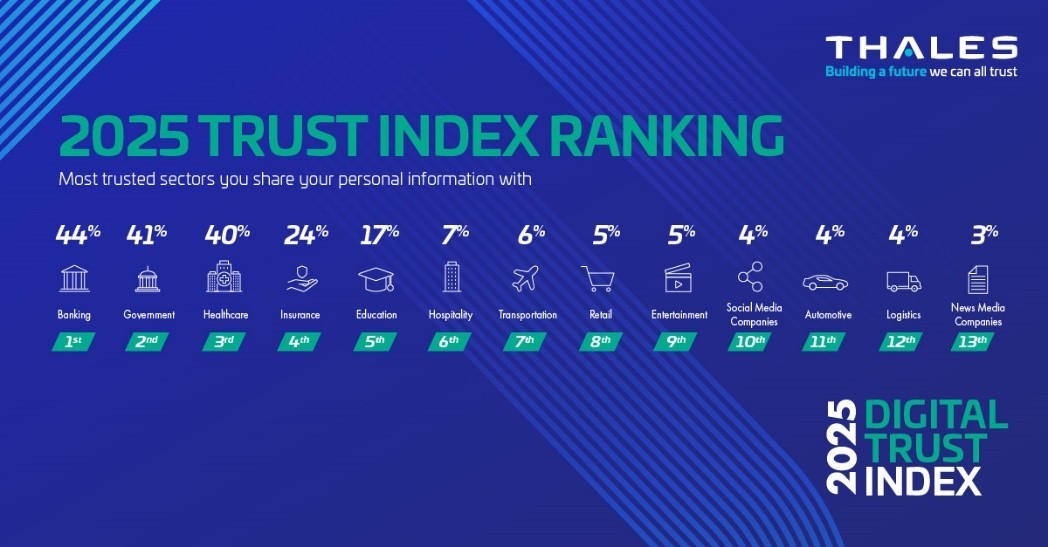Thales has published the findings of its 2025 Digital Trust Index – Consumer Edition, revealing a universal decline in trust for digital services compared to this time last year. Across 13 different sectors, only insurance, banking and Government saw either their trust level remain unchanged or increase very slightly. When asked which sector they trusted with their personal data, not one sector reached above 50% approval. Thales surveyed over 14,000 consumers across 14 countries about their online relationship with brands and services, their privacy expectations, and how brands can earn their trust.
This decline in trust comes as nearly one in five (19%) have been informed that their personal data has been compromised in the past year. Consequently, 82% have abandoned a brand in the past 12 months due to concerns about how their personal data was being used.
Global Trust Index Ranking
Banking emerged as the most trusted sector for the second year in a row. However, the research found a stark demographic shift, peaking at 51% of over 55s, and languishing at just 32% of Gen Z consumers (16-14-year-olds).
Government organisations are the only sector where trust increased compared to the previous year, with 42% of global citizens ranking them as a top trusted sector with their personal data, compared to 37% last year.
News media organisations polled the lowest, with only 3% of citizens ranking them as a top trusted sector. Social media, logistics, and automotive sectors only ranked marginally higher, at 4% each.
Commenting on the findings, Sebastien Cano, Senior Vice President, Cybersecurity Products at Thales said: “Global trust in digital services is decreasing or remaining stagnant at best, even among highly regulated industries. One area that does not remain stagnant is the threat landscape. Consumers are more aware than ever before of online threats, and the consequences of their data falling into the wrong hands. As cyber threats evolve so does consumer scepticism, and brands must continuously adapt their security measures to stay ahead and rebuild confidence.”
Too Much Onus on Consumers
More than four in five (86%) of consumers expect some level of data privacy rights from the companies they interact with online. However, amidst growing concerns about data privacy, 63% believe that too much onus is placed on the consumer when it comes to data protection. Over a third (37%) said that they only shared their personal data with an organisation because it was the only way to access a product or service. Only 34% said it was because they trusted organisations to use this data sensibly.
This frustration is also evident when it comes to customer experience. Whether it’s being kicked out of an online queue, being presented with price fluctuations, or experiencing downtime on a website, one in three consumers (33%) voiced frustration with ecommerce, directly caused by bad bots manipulating the customer purchasing process.
Despite this growing scepticism, customers have been clear about their expectations. 64% of consumers said that their confidence in a brand or service would significantly increase if it adopted and implemented emerging or advanced technologies such as passwordless authentication, biometrics, multifactor authentication, and responsible use of AI.
“The Thales Digital Trust Index findings should be alarming to enterprises that conduct business online. The global decrease in digital trust is not only quantifiable, but preventable. Deploying modern Customer Identity Access Management (CIAM), Fraud Reduction Intelligence Platforms (FRIP), GenAI, and data privacy protection solutions properly, with optimizing the customer journey as the primary design principle, will lead to better business and consumer outcomes,” said John Tolbert, Director of Cybersecurity Research at KuppingerCole Analysts.







